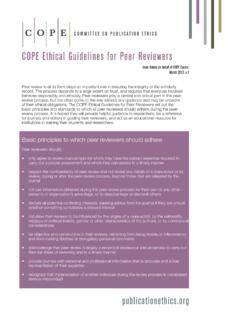Transcription of TITLE: MEDICAL STAFF POLICY AND PROCEDURE ON PEER …
1 TITLE: MEDICAL STAFF POLICY AND PROCEDURE ON peer review MANUAL: MEDICAL STAFF POLICY / PROCEDURE Page 1 of 11 Effective Date: Approval /s/ Margaret McEvoy, , Chief of STAFF Reviewed/Revised: 06/02, 10/04, 12/06, 4/28/09, 08/11, 02/13, 2/17 Replaces MEDICAL STAFF POLICY and Proce-dure on peer review and Focused Professional Practice Evaluation POLICY I. VALUES CONTEXT Our value of Excellence requires that, through the ongoing review of data and evaluation of practitioner performance, we strive to improve the care provided to our patients. II. PURPOSE/EXPECTED OUTCOMES The purpose of this POLICY is to define the MEDICAL STAFF peer review process including ongoing professional practice evaluation (OPPE) and focused professional practice evaluation (FPPE) in order to continuously improve the quality, safety, and effectiveness of care rendered by members of the MEDICAL STAFF and allied health practitioners at Santa Rosa Memorial Hospital.
2 This POLICY defines procedures for data collection and event and clinical case reviews, as well as the mechanisms by which the process will assure that timely, fair, and objective assessments of practitioner competence are accomplished. When applicable, systems and process issues germane to the quality and safety of patient care will be integrated into the Hospital s performance improvement program. Responsibility and accountability for the peer review process resides with the MEDICAL Executive Committee (MEC). III. POLICY All activities and records conducted as part of this POLICY are confidential and protected from discovery pursuant to The Healthcare Quality Improvement Act and California Evidence Code 1157.
3 As such, all individuals participating in peer review are to abide by the confidentiality provisions of the MEDICAL STAFF Bylaws and any other agreements required to participate in the MEDICAL STAFF peer review process. The MEDICAL STAFF departments are responsible for performance of peer review activities under the leadership of the Department Chairs, with support and direction provided by the MEDICAL Executive Committee and Quality review Committee. peer review activities are comprised of individual case review and aggregate rate based review utilizing all available data sources to identify and assess practitioner performance.
4 See Addendum C. for Data Sources. In order to assist the MEDICAL STAFF , the Performance Improvement Department will initiate and maintain the peer review process documentation with MEC oversight. The peer review process Page 2 of 11 MEDICAL STAFF POLICY and PROCEDURE on peer review documentation shall be initiated and maintained by the Performance Improvement Department. See Addendum B for algorithm for case identification and peer review process. IV. CLINICAL COMPETENCIES SUBJECT TO review Core Clinical Competencies in this POLICY are defined by concepts developed by the American Council for Graduate MEDICAL Education (ACGME), The American Board of MEDICAL Specialties (ABMS), and The Joint Commission (TJC).
5 These competencies include: Patient Care & Procedural Skills MEDICAL Knowledge Practice Based Learning and Improvement Interpersonal & Communication Skills Professionalism System Based Practices V. TYPES OF REVIEWS A. Rate based Rate based reviews are generated from aggregate coded data sets. The accuracy and validity of a rate must be verified before committee presentation and/or use in evaluating a practitioner s performance. B. Single case or event Single case reviews are identified by the screening and case identification elements C. Focused Professional Practice Evaluation (FPPE)--- is a process whereby the MEDICAL STAFF evaluates the competency of a practitioner who does not have documented evidence of competent performance of the privilege(s) in question at this hospital ( , new applicant or request for new privileges) or about whom questions have been raised concerning the ability to provide safe, high quality patient care ( , currently privileged practitioner).
6 A Focused Evaluation will encompass a detailed consideration and evaluation of a single event, series of cases or events, or an unexpected rate or pattern of events. A Focused Evaluation may also be an intensified proctoring or privileging decision. The FPPE process is appropriate for: 1. Proctoring: The evaluation of practitioner without current performance documentation at the Hospital requesting new privileges. A FPPE may also be undertaken when a practitioner has requested new or expanded privileges, upon the recommendation of the Credentials Committee. 2. Clinical FPPE: The assessment of practitioner in response to concerns regarding the provision of safe, high quality patient care.
7 A FPPE may be initiated and performed by the QRC or the MEC. 3. Behavioral FPPE: The MEC may initiate and perform a Behavioral Focused Page 3 of 11 MEDICAL STAFF POLICY and PROCEDURE on peer review Practitioner Practice Evaluation in response to reported behavioral events requiring action as directed by the Disruptive Behavior POLICY . D. Rule Violations Rule violations represent a practitioner s failure to comply with professional standards and/or patient safety standards established by regulatory requirements, statutes, and Hospital POLICY . Rules are documented in the MEDICAL STAFF Bylaws and Rules and Regulations, and MEDICAL STAFF and Hospital POLICY and PROCEDURE .
8 Repeated rule violations shall be addressed as unprofessional conduct and corrective action pursued through the Behavioral FPPE processes VI. CONCLUSIONS OF review A. Aggregate Reports 1. Rate based reviews are used for generating aggregate reports 2. Trended clinical OPPE Reports to QRC for consideration every eight (8) months. B. Single Case review review recommendations and scores are made at the following steps in the review process: 1. Preliminary peer review RN screening - The peer review RN provides a preliminary review of the case and assigns and refers cases pursuant to the instruction of the Department chair, their designee or physician reviewer.
9 2. Preliminary Physician review - Physician reviewer provides an out of committee review and completes the peer review document and suggests a peer review score (PR). 3. QRC conclusions and recommendations - Committee discusses case and determines the final peer review score (QRC). 4. All clinical case scores are reported to the MEC. V II. PRACTITIONER PARTICIPATION A. All members of the Organized MEDICAL STAFF are expected to participate in the peer review process in good faith. B. All peer review activities are confidential with discussion to occur in MEDICAL STAFF committees.
10 Page 4 of 11 MEDICAL STAFF POLICY and PROCEDURE on peer review C. Clinical Case review 1. A Department or the QRC Chair may request written response from a Practitioner to clarify questions or concerns identified during the review process, or they may require a practitioner to attend a meeting in person. 2. When either request is made, the Practitioner s participation is mandatory as described in Article of the MEDICAL STAFF Bylaws. 3. When clinical case results in an Educational Opportunity , the involved practitioner shall be contacted provided a copy of the case review and given the opportunity to provide a written response to the clinical review or to attend the QRC/PRC meeting where the case will be discussed, as appropriate D.





